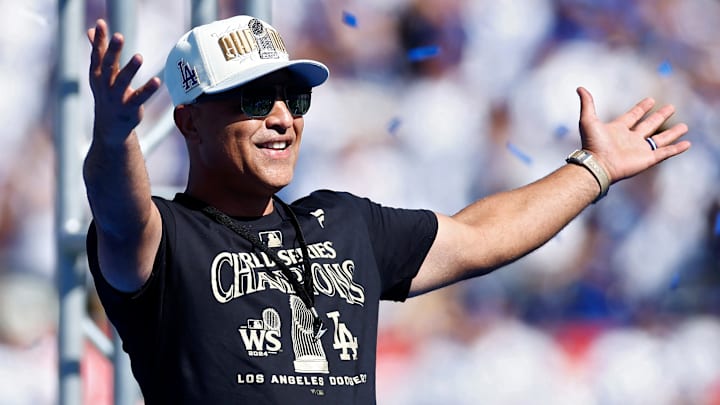The MLB offseason is officially in full swing, and the rumor mill is working overtime with Juan Soto seemingly nearing a decision and the madness of the Winter Meetings just weeks away. But while we wait to see which big names will land where, there's still one more bit of business to attend to in order to put a bow on 2024: handing out some awards.
On Monday night, the BBWAA unveiled the finalists for its big four individual awards: MVP, Cy Young, Rookie of the Year and Manager of the Year. (There are three finalists in both the AL and NL, with the winner of each award announced in live ceremonies throughout next week.) Some choices were slam dunks; you don't need us to tell you that Aaron Judge and Shohei Ohtani were finalists for the AL and NL MVP Awards, respectively. Some, however, are bound to leave certain fan bases crying foul.
So let's take a look at three particularly significant snubs. And remember: For each player included, another has to be removed. It's a crime that Chicago Cubs ace Shota Imanaga and St. Louis Cardinals shortstop Masyn Winn aren't in the running for NL Rookie of the Year honors, but since we can't in good conscience put them ahead of Pittsburgh Pirates righty Paul Skenes, Milwaukee Brewers outfielder Jackson Chourio and San Diego Padres outfielder Jackson Merrill, we can't consider them snubs.
For more news and rumors, check out MLB Insider Robert Murray’s work on The Baseball Insiders podcast, subscribe to The Moonshot, our weekly MLB newsletter, and join the discord to get the inside scoop between now and the MLB offseason.
3. NL Cy Young Award: Michael King, San Diego Padres
Who should be swapped out: Paul Skenes, Pittsburgh Pirates
Don't get me wrong: Skenes was sensational in 2024, among the most dominant rookie performances in recent memory, and health permitting he'll be in the running for this award for many years to come. But while it's not his fault that the Pirates waited so long to bring him up to the Majors, the fact remains that he threw just 133 innings in the Majors this season. That's well below the range of most of his competitors, and it's 40.2 innings shy of King, who was brilliant in his first season with the San Diego Padres.
On an inning-by-inning basis, Skenes was the better pitcher this year. But the workload gap comprises some 6-8 starts, and that's a major difference in value — so much so that it should've outweighed the difference in performance. King was fourth in NL ERA (Skenes didn't pitch enough to qualify), ninth in WHIP, fourth in K/9 and seventh in pitcher bWAR. He was one of the very best pitchers in the league, and he did it from April to September, a reliability that merits him the nod here. Skenes will just have to settle for Rookie of the Year honors.
2. AL Cy Young Award: Corbin Burnes, Baltimore Orioles
Who should be swapped out: Emmanuel Clase, Cleveland Guardians
If the workload gap between King and Skenes was broad, the gap between Clase and Burnes is a chasm. Given how critically important starting pitching is, it's just very hard to make the case that a reliever — even one who was as historically awesome in 2024 as Clase was, with a 0.61 ERA and an AL-leading 47 saves — deserves consideration for this award over a starter if the production is anywhere close.
And Burnes is absolutely worthy of being a Cy Young finalist. He wasn't quite at his peak for the O's this year, but he was still darn good, with a 2.92 ERA over 194.1 innings of work. Giving your team a chance to win every fifth day is simply more valuable than a few shutdown innings a week, and the field of starters in the AL this year was too crowded to award one of three finalist spots to Clase.
1. NL Manager of the Year Award: Dave Roberts, Los Angeles Dodgers
Who should be swapped out: Mike Shildt, San Diego Padres
This is the big one. You can understand the case for Carlos Mendoza, who took a team that not much was expected of and weathered not one but two major midseason storms in order to get the New York Mets not only to the postseason but all the way to the NLCS. And a similar case can be made for Pat Murphy, who filled Craig Counsell's shoes and kept the Milwaukee Brewers rolling despite major roster turnover and a very young core.
What's the case for Shildt over Roberts, however? The San Diego Padres had tons of talent, and while they dealt with some injury issues (particularly to the starting rotation), this is a team that was absolutely good enough to win the 93 games they wound up winning during the regular season. You can point to the structural advantages Roberts has given the Dodgers' financial war chest and player development prowess, but he's a part of the latter, and he still had to manage injuries to seemingly every one of the team's starting pitchers. Despite all that adversity, L.A. still captured the NL West once again, topping San Diego by five games. Roberts gets more to work with on a year-by-year basis, but that shouldn't disqualify him entirely, and his work juggling this Dodgers roster deserves more credit than it got.
